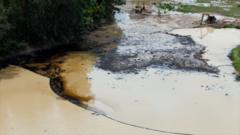Data released by a former employee of Ecopetrol indicates that the oil giant has left hundreds of pollution sites untreated, leading to environmental degradation and health threats for local communities.**
Whistleblower Exposes Ecopetrol’s Extensive Pollution Crisis in Colombia**

Whistleblower Exposes Ecopetrol’s Extensive Pollution Crisis in Colombia**
A comprehensive investigation uncovers the alarming environmental impact of Colombia’s largest oil producer, Ecopetrol, as whistleblower reveals hidden disaster records.**
Colombian energy corporation Ecopetrol has been implicated in widespread pollution affecting numerous water sources and ecological zones, according to findings from the BBC World Service. A whistleblower has disclosed more than 800 records concerning contaminated sites from 1989 to 2018, indicating the company has not reported around 20% of these incidents. Since the release of this information, evidence has emerged showing that oil spills continue to occur regularly.
Ecopetrol asserts that it adheres to Colombian regulations and boasts of leadership in sustainability practices. The company's main operations are centered around Barrancabermeja, a region critical for meeting the energy needs of millions through the Magdalena River.
Local fishing communities express deep concern over the adverse impacts of oil contamination on local wildlife, including endangered species such as river turtles and manatees. Reports from fishermen in the area reveal that fish caught from the river often emit a strong oil odor, and oil slicks were visible during a visit by BBC journalists last June. Testimonies from community members suggest that oil pollution originates from the Ecopetrol refinery.
The whistleblower, Andrés Olarte, who previously served as an advisor to the Ecopetrol CEO, became increasingly troubled by the pollution data he encountered during his tenure. Olarte has since shared internal data with the Environmental Investigation Agency and the BBC, demonstrating a long-standing history of unresolved environmental impacts where contamination issues persist for years.
Ecopetrol's former CEO, Felipe Bayón, denies any intentional withholding of pollution information and attributes many spills to acts of sabotage. However, statistics reveal that the company has reported thousands of oil spills annually since 2020, indicating a dire pollution crisis.
Environmental activists in the Barrancabermeja area have voiced alarm over the dramatic loss of wildlife, and they have encountered threats for their efforts to protect the environment. While Olarte and local fisherwoman Yuly Velásquez have reported receiving numerous threatening communications linked to their environmental advocacy, Ecopetrol insists it undertakes rigorous procedures to avoid affiliations with illegal security forces.
This situation raises critical questions regarding the corporate responsibility of Ecopetrol amid Colombia's complex historical context of violence against environmentalists, exacerbated by the country's armed conflict. As Olarte seeks to advocate for his community and the environment, he emphasizes the need for accountability from Ecopetrol concerning its environmental practices.
Though the challenges facing local ecosystems are stark, Velásquez remains resolute in her fight for justice and environmental protection—asserting the necessity of their voices despite the dangers they face in pursuing a healthy environment free from pollution. As Colombia grapples with these crucial issues, the intersection of energy production, environmental ethics, and community well-being becomes increasingly poignant.




















